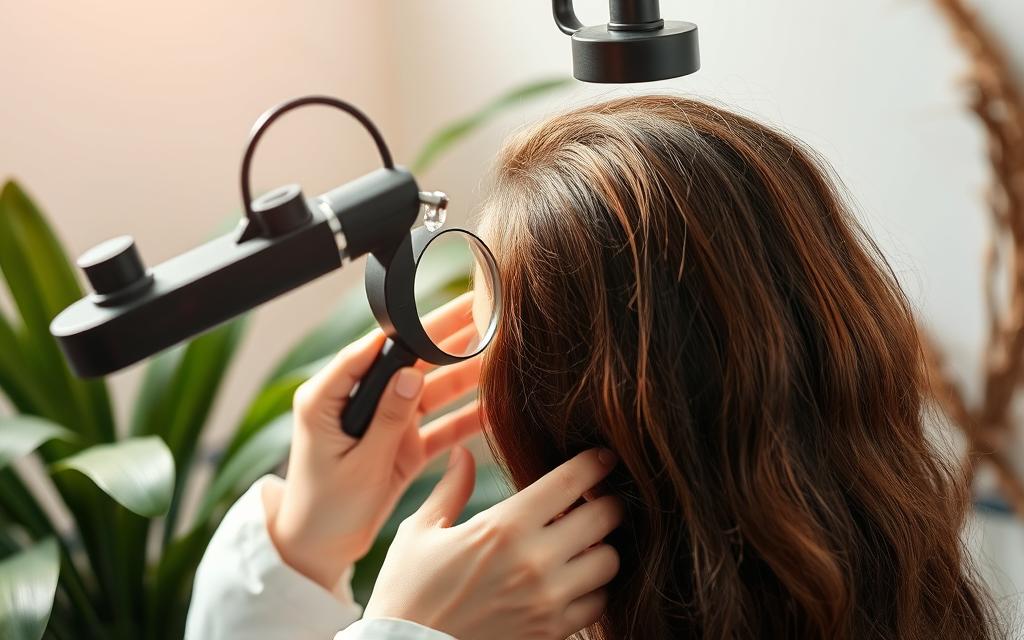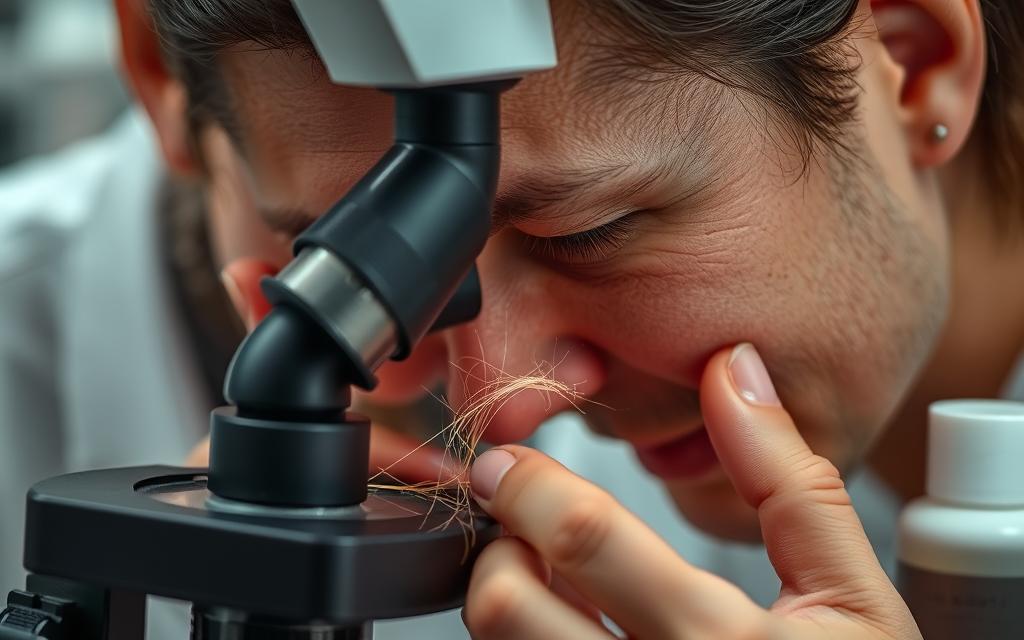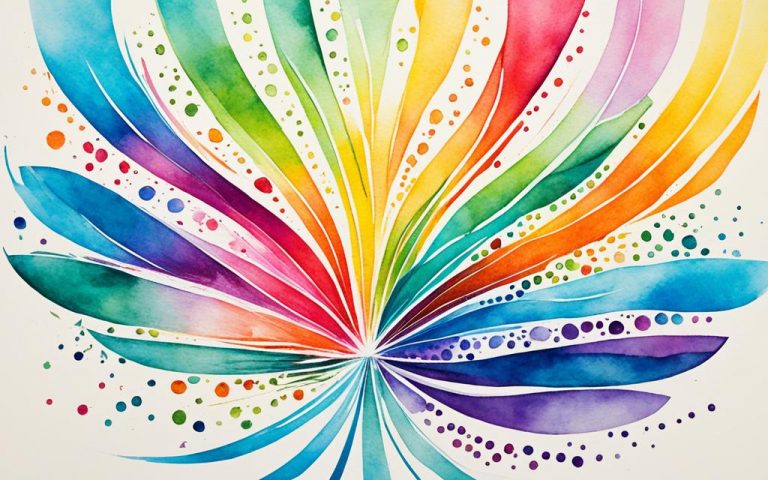What Is a Trichologist? Hair Health Specialist
Are you dealing with hair loss or scalp issues? A trichologist could be the expert you’re looking for. They specialize in trichology, the study of hair and scalp health. Trichologists check your hair and scalp to find out what’s wrong and suggest treatments for things like hair breakage or scalp psoriasis1.
Trichologists aren’t doctors but they are key in solving hair-related problems. They give advice and solutions for hair loss, oily scalps, and other common issues. But remember, they can’t prescribe drugs or do medical procedures2.
Trichology comes from the Greek word “Trikhos,” meaning hair. It’s a field that links cosmetic hair care with medical treatment. Trichologists use their knowledge of hair and scalp health to help keep your hair in top shape.
Key Takeaways
- Trichologists are hair health specialists who study and treat hair and scalp problems.
- They can diagnose conditions and recommend treatments but cannot prescribe medications.
- Trichology combines elements of cosmetic hair care and medical knowledge.
- Trichologists offer expertise in various hair issues, from hair loss to scalp disorders.
- Consulting a trichologist can be beneficial for those experiencing persistent hair or scalp problems.
Understanding Trichology: The Science of Hair and Scalp
Trichology is the study of hair and scalp health. It’s become more important lately. This branch of dermatology helps diagnose and treat hair and scalp problems. It gives hope to those facing hair issues34.
Definition and Origins of Trichology
Trichology started in 1860 in a London barbershop. It grew into a special study area. The first Institute of Trichologists was set up in 1902, marking a big step in hair science. Now, trichologists are experts ready to tackle many hair and scalp problems3.
The Importance of Hair Health in Overall Well-being
Hair health is key to our overall well-being. Studies show that having a full head of hair makes people seem more attractive. Those with hair loss, like androgenetic alopecia, often feel sad, anxious, and less confident5.

Historical Perspective on Hair Care Specialists
People have cared about hair health for a long time. In ancient Egypt, doctors focused on head diseases as early as 484-425 BC. The study of hair science started in the 17th century with Robert Hooke and Marcello Malphighi. Over time, many treatments for hair loss have been tried, from herbal remedies to spiritual practices.
| Era | Hair Care Practices | Significant Developments |
|---|---|---|
| Ancient Egypt | Oils and herbal remedies | Specialized physicians for head diseases |
| 17th Century | Scientific observation | First microscopic studies of hair |
| 19th Century | Barbershop treatments | Birth of trichology as a field |
| 20th Century | Medical interventions | Establishment of trichology institutes |
| 21st Century | Advanced diagnostics and treatments | Integration of holistic approaches |
Now, trichology takes a full approach to hair care, looking at diet, lifestyle, and health. Trichologists use new tools and create custom treatment plans. These plans might include creams, diet advice, and changes in lifestyle34.
What Is a Trichologist?
A trichologist is a hair loss specialist and scalp expert. They focus on diagnosing and treating hair, scalp, and hair follicle issues. The term “trichologist” has been used since 1863, showing it’s a well-known profession6.
These experts know a lot about anatomy, physiology, genetics, microbiology, nutrition, and chemistry. This knowledge helps them understand hair loss and how to treat it7.
Trichologists learn how to care for human hair and scalp in their special role8. Even though they’re not doctors, medical professionals can study trichology too8. This lets trichologists connect cosmetology and dermatology.
Trichologists deal with many hair problems. They help with androgenetic alopecia, scarring alopecia, and more7. They look at your whole life, including your health, genes, and lifestyle, to find the best treatment7.
The International Association of Trichologists (IAT) started in California in 19748. It’s one of many groups supporting trichology. These groups offer training, certification, and more to keep the industry high-quality.
| Aspect | Trichologist’s Role |
|---|---|
| Focus | Hair and scalp health |
| Training | Specialized in trichology |
| Approach | Holistic assessment |
| Treatment | Non-medical solutions |
In short, a trichologist is a pro who helps with hair and scalp health. They prevent problems and help with hair growth. Their skills are key for anyone with hair or scalp issues.
The Role of Trichologists in Hair Health
Trichologists are key to keeping hair healthy. They focus on finding and treating hair and scalp problems. They give personalized help to their clients.
Diagnosing Hair and Scalp Conditions
Trichologists do detailed hair loss consultations. They look at medical history, lifestyle, diet, and environment9. They use scalp microscopes to check hair and scalp health10.
This detailed check-up helps them accurately diagnose issues like alopecia, dandruff, psoriasis, and other scalp problems.
Recommending Treatments and Solutions
After finding the problem, trichologists suggest specific scalp treatments. These can be creams, laser therapy, or changes in lifestyle9. They also recommend better nutrition for better hair health.
Results can show up in weeks for some, but it might take months for others.
Collaborating with Other Medical Professionals
Trichologists work with other doctors even though they’re not medical doctors8. They might send patients to dermatologists or primary care doctors when needed. This teamwork has grown with new hair loss treatments, starting with minoxidil in the 1980s and finasteride in the 1990s8.
| Trichologist Duties | Benefits |
|---|---|
| Hair and scalp examination | Accurate diagnosis of conditions |
| Personalized treatment plans | Targeted solutions for hair health |
| Lifestyle and nutrition advice | Holistic approach to hair care |
| Collaboration with medical professionals | Comprehensive patient care |
Education and Training for Trichologists
To become a certified trichologist, you need specialized training. This includes both academic courses and hands-on practice. The process takes 6 months to a year, depending on the school.
Trichology education teaches you about scalp disorders and hair growth. You’ll learn how to diagnose and treat hair issues. Many programs also offer practical experience with clients.
After finishing your training, you can get certified. This shows you’re an expert and meet professional standards. Many trichologists join professional groups to keep up with new trends.
Studying trichology can pay off. In the U.S., trichologists make about $54,787 a year or $26.34 an hour11. The highest salaries are in New York, California, and Texas.
There’s a growing need for skilled trichologists. A survey showed 70% of beauty pros see clients with thinning hair or bald spots12. Also, 90% of hairstylists think trichology is key for their success12.
Getting certified in trichology can really boost your income. Certified pros can earn an extra $118,368 a year, just by doing three hair loss consultations a week12. This shows the big opportunities in trichology.
| Aspect | Details |
|---|---|
| Average Salary | $54,787 per year |
| Hourly Rate | $26.34 |
| Top Earning States | New York, California, Texas |
| Potential Income Increase | $118,368 annually |
| Client Demand | 70% of professionals report 1-40% clients with hair issues |
Common Hair and Scalp Conditions Treated by Trichologists
Trichologists are experts in treating many hair and scalp issues. They know how to handle various conditions that affect hair health and growth.
Pattern Baldness and Hair Loss
Androgenetic alopecia, or male and female pattern baldness, is a big concern for trichologists. By their late forties, nearly half of men start to lose hair13. This condition often comes from genetics and can be caused by high levels of dihydrotestosterone (DHT)14. Women with female pattern hair loss might also have symptoms of Polycystic Ovary Syndrome (PCOS)13.
Alopecia and Other Hair Loss Forms
Trichologists treat different types of alopecia, including hair loss caused by stress. On average, we have about 100,000 hair follicles on our head, losing 50-100 hairs daily is normal14. If hair loss goes beyond this, it could be due to telogen effluvium or alopecia areata, needing professional help.
Scalp Disorders and Infections
Keeping the scalp healthy is key for good hair growth. Trichologists deal with conditions like psoriasis, which causes redness and scales, and seborrheic dermatitis, leading to itching and crusting15. Folliculitis, a bacterial infection of hair follicles, is another issue they address. It needs quick treatment to avoid scarring and hair loss15.
Hair Texture and Growth Issues
Trichologists also work on hair texture and growth problems. They might suggest treatments like Platelet-Rich Plasma (PRP) therapy, which helps stimulate hair growth13. For a correct diagnosis, they might do scalp biopsies or hair pull tests to find out what’s causing hair and scalp issues14.
Trichologist vs. Dermatologist: Understanding the Difference
When you think about hair health, you might ask if you should see a trichologist or a dermatologist. Both experts are key in solving hair and scalp problems, but they work in different ways. Trichologists focus on hair and scalp health, finding the reasons behind hair loss and scalp issues16. Dermatologists are doctors who treat skin, hair, and nail problems16.
Trichologists look at hair loss from a complete view, making plans that get to the heart of the problem16. They usually spend over an hour with patients at first, offering many ways to treat hair loss17. Dermatologists, however, might only spend about 5 minutes with patients and mainly use treatments like minoxidil or steroids17.
For treating hair with medicine, dermatologists can prescribe drugs and do surgeries. They can handle many hair loss reasons, like skin diseases, alopecia, and hormonal issues16. Trichologists, though not doctors, work with doctors for blood tests and offer treatments like supplements and low-level laser therapy17.
When picking between a trichologist and a dermatologist, think about what you need. If you’re dealing with ongoing hair loss or scalp irritation, a trichologist might be a good choice16. For serious hair loss or skin scalp issues, seeing a dermatologist might be better16. Both experts aim to help your hair, but they have different ways of doing it in this comparison.
The Consultation Process with a Trichologist
A trichologist consultation is a detailed check-up for your hair and scalp health. It aims to find and fix different hair and scalp problems. When you meet a trichologist, they will carefully check your hair and scalp health.
Initial Assessment and Medical History Review
Your first step is talking about your health history, lifestyle, diet, and how you take care of your hair. This info helps the trichologist figure out why you might be facing hair or scalp issues. They can handle many problems like hair loss, dandruff, psoriasis, and alopecia18.
Hair and Scalp Examination Techniques
The trichologist will do a detailed check-up of your scalp with special tools. This includes:
- Hair pull test to see how much hair you lose
- Trichoscopy for a close look at your scalp
- Densitometry to measure how thick your hair is
- Sebum analysis to check how much oil your scalp makes
These tests can spot issues like diffuse hair loss. This means you might lose up to 5-6 times more hair than usual1920.
Developing Personalized Treatment Plans
Your trichologist will make a plan just for you after checking you out. This could mean creams, food tips, or even plasma lifting or mesotherapy for alopecia19. Sometimes, they might suggest supplements or send you to other experts for full care2018. Remember, fixing hair and scalp health often means working on skin health and balancing your body’s chemistry.
Advanced Diagnostic Tools Used by Trichologists
Trichologists use the latest hair diagnosis technology to check and treat scalp and hair issues. These tools help them analyze and create specific treatment plans. They tackle problems that affect many people21.
Trichoscopy is a key tool that magnifies the scalp and hair follicles up to 60 times. It helps tell apart different hair loss conditions. This makes diagnoses more accurate.
Hair analysis is also vital for spotting structural damage or infections. By looking at individual hair strands, trichologists can find out if there’s chemical damage, nutritional shortages, or infections. These could be causing hair loss or scalp issues22.
Sometimes, a scalp biopsy is needed for deeper insights. This involves taking a small scalp tissue sample for a closer look under a microscope. It helps confirm or rule out certain conditions.
Blood tests are often done to check for hormonal imbalances, thyroid problems, or nutritional shortages. These could be causing hair loss. The tests show how overall health affects hair growth22.
By using these advanced tools, trichologists can make detailed treatment plans. These plans target the real causes of hair and scalp problems. This leads to better and more tailored solutions for patients.
Treatment Options Offered by Trichologists
Trichologists offer many hair loss solutions and scalp treatments. They work with each person’s unique hair and scalp issues. They give personalized trichology therapy to meet individual needs.
Topical Treatments and Scalp Therapies
Trichologists suggest treatments like minoxidil, which you can buy over-the-counter or by prescription, to help hair grow23. They also recommend scalp therapy products to make the scalp healthy. This helps hair grow better24. Sometimes, they use low-level laser therapy to make hair follicles work better and make hair thicker.
Nutritional Advice and Supplements
They focus on nutrition and supplements for hair health. Trichologists might suggest vitamins or minerals based on your blood tests. This helps fix any nutrient gaps that could slow down hair growth24.
Hair Care Routines and Lifestyle Recommendations
Trichologists give advice on how to take care of your hair. They might suggest gentle hair care, how to handle heat styling, and the best products for your hair type. They also talk about how your lifestyle affects your hair, like stress and diet.
For serious hair loss, they might recommend treatments like finasteride for men or hair transplants2325. In tough cases, they work with doctors or other experts to take care of your hair and scalp fully.
The Importance of Proper Hair and Scalp Care
Keeping your scalp healthy is key for great hair. A pro in scalp care says an unhealthy scalp can cause dandruff, too much oil, and hair loss26. Taking good care of your scalp helps stop hair loss and keeps your hair healthy.
Important nutrients for a healthy scalp and hair include vitamin D3, iron, ferritin, zinc, and folate26. Eating these can make your hair look better. Brushing your hair often, even when you don’t wash it, is also important for a healthy scalp26.
A good scalp care routine means washing your hair 2-3 times a week with a gentle shampoo, conditioning, and using scalp treatments or massages26. This keeps your scalp’s oil in balance and helps your hair grow well.
“Proper scalp care is crucial for healthy hair growth.” – Dr. Ted Lain, Dermatologist
Signs of an unhealthy scalp include a lot of hair falling out, constant itchiness, dryness or oiliness, dandruff, redness, inflammation, and thinning hair26. If you see these signs, it’s time to change your hair care habits and maybe talk to a scalp expert.
Being consistent with scalp care is important. You’ll start to see results in weeks to months26. Taking care of your scalp helps prevent hair loss and keeps your hair looking great.
| Scalp Treatment | Main Benefit |
|---|---|
| Act+Acre Scalp Detox Oil | Detoxifies scalp |
| Moroccanoil Oily Scalp Treatment | Balances oily scalp |
| Nioxin Scalp Recovery Soothing Serum | Soothes irritated scalp |
| Scalp Revival Charcoal + Tea Tree Mask | Deep cleanses scalp |
Choosing the Right Trichologist for Your Needs
Finding a qualified trichologist is key to solving your hair and scalp issues. Look for recommendations and read reviews to learn from others’ experiences27.
Qualifications and Certifications
Make sure your trichologist has the right training and certifications in trichology27. Not all are doctors, but many are experts in hair care28. Check their qualifications to get top-notch care.
Questions for Your Initial Consultation
Ask these questions during your first meeting:
- How they diagnose and treat hair issues
- Success rates for cases like yours
- Side effects of treatments
- Costs and payment plans
- What follow-up care is offered
Trichologists look at both the health and emotional sides of hair care, offering full support28.
Red Flags to Watch Out For
Watch out for trichologists who:
- Claim quick fixes
- Push expensive products
- Don’t have proper credentials
- Won’t work with other doctors
Trust your gut after the first meeting. Feeling at ease, heard, and sure about the trichologist’s skills can help you get great results27.
Think about these things when picking a trichologist. This way, you’ll find someone who meets your needs and values, giving you the best care for your hair and scalp.
The Future of Trichology: Advancements and Trends
The field of trichology is changing fast, with new innovations coming up. Stress and pollution are big causes of hair loss, so trichologists are working on new treatments29. Expect to see more hair care that’s tailored to you, using genetic analysis and AI.
New solutions for severe hair loss are being developed. Trichologists are tackling the main causes of hair loss, leading to better treatments29. Future treatments might include PRP therapy, Folliculoscopy, and Trichoscopy. These methods are becoming key in trichology education29.
Research on hair loss is exploring stem cell therapies and hair cloning. These could change how we treat severe hair loss30. As trichology advances, we’ll see more teamwork between trichologists and other doctors. This will lead to better care for hair and scalp health.
The future of trichology is promising, thanks to advances in medical science29. As more people learn about it, trichology will become more recognized and standardized. This will create new job opportunities for doctors in trichology, improving their careers29.
FAQ
What is a trichologist?
A trichologist is a specialist in trichology, the study of hair and scalp health. They don’t have a medical degree but get special training to treat hair and scalp issues.
What conditions do trichologists treat?
Trichologists handle many hair and scalp problems. This includes male and female baldness, hair loss, scarring alopecia, and more. They also treat scalp disorders, hair texture issues, and growth problems.
What is the difference between a trichologist and a dermatologist?
Dermatologists are medical doctors who can give prescriptions and perform surgeries. Trichologists focus on hair and scalp health but can’t give drugs or do surgery. They are not medical doctors.
What happens during a trichologist consultation?
At a consultation, the trichologist looks at your hair and scalp health. They check your medical history, diet, lifestyle, and how you care for your hair. They might do a hair pull test and trichoscopy to examine the scalp closely.
What diagnostic tools do trichologists use?
Trichologists use tools like trichoscopy, hair analysis, blood tests, and scalp biopsies. These help them find hair and scalp problems and plan treatments.
What treatment options do trichologists offer?
Trichologists offer treatments like creams, scalp therapies, and nutritional advice. They suggest over-the-counter products and may refer you to doctors for prescription treatments if needed.
How do I choose a qualified trichologist?
Pick a trichologist with the right qualifications and certifications. Check their training, experience, and how they approach treatment. Watch out for false promises, high-pressure sales, or lack of proper certification.
Source Links
- https://www.webmd.com/a-to-z-guides/what-is-a-trichologist – What Is a Trichologist?
- https://www.meditresse.com/blog/trichologist-versus-hair-loss-specialist-whats-the-difference/ – Trichologists versus Hair Loss Specialists: What’s the Difference?
- https://www.gthairboutique.com/post/trichology-101-understanding-the-science-of-hair-and-scalp-health – Trichology 101: Understanding the Science of Hair and Scalp Health
- https://otcoclinic.com/blog/exploring-trichology-for-scalp-wellness/ – What Is Trichology for Scalp Health? • OT.CO Clinic
- https://www.themaitlandclinic.com/trichology-explained/ – Understanding Trichology | Hair and Scalp Non-Surgical Solutions
- https://www.merriam-webster.com/dictionary/trichologist – Definition of TRICHOLOGIST
- https://www.topdoctors.co.uk/medical-dictionary/trichology – Trichology: what is this branch of medicine? | Top Doctors
- https://www.ncbi.nlm.nih.gov/pmc/articles/PMC6219239/ – Trichologist, Dermatotrichologist, or Trichiatrist? A Global Perspective on a Strictly Medical Discipline
- https://hairlossclinic.ca/introduction-to-trichology-and-role-of-a-trichologist/ – Introduction to Trichology and Role of a Trichologist
- https://www.hairpalace.co.uk/blog/trichologist/ – Trichologists: What Do They Do?
- https://cosmetologyguru.com/blog/how-to-become-a-trichologist/ – How to Become a Trichologist – A Comprehensive Guide
- https://aahsd.com/ – American Academy of Hair and Scalp Diseases | AAHSD
- https://www.hairandskinscience.co.uk/what-is-a-trichologist-can-they-help-with-hair-loss/ – What is a Trichologist & Can They Help with Hair Loss? – Hair & Skin Science
- https://wimpoleclinic.com/blog/common-diagnostic-tests-trichologist-will-perform/ – Wimpole Hair Transplant Clinic
- https://trichologyspecialist.co.uk/hair-scalp-problems/scalp-disorders/ – Scalp Disorders – Trichology Specialists
- https://noellesalon.com/blogs/hair-color-style/trichologist-vs-dermatologist-for-hair-loss-in-boston – Trichologist vs Dermatologist for Hair Loss In Boston
- https://www.trichology.com/trichology-vs-dermatology/ – Trichology VS Dermatology | Trichology
- https://fortesclinic.co.uk/blog/what-is-a-trichologist/ – What Is A Trichologist? | Fortes Clinic
- https://hairmed.center/en/trichologist-consultation/ – Trichologist consultation – Hairmed
- https://www.metamorphosis-clinic.com/knowing-when-to-consult-a-trichologist-addressing-hair-loss-and-scalp-conditions/ – Trichologist Consultation: Tackling Hair Loss & Scalp Issues
- https://www.trichology.com/understanding-alopecia-with-trichologists/ – Understanding Alopecia With Trichologists
- https://www.graffhairtechnology.com/services/trichology/ – Trichology – Graff Hair Technology
- https://regrowherbalhairtreatment.com/what-trichologist-treatments-are-offered-by-trichologists/ – What Trichologist Treatments are Offered by Trichologists? – Regrow Herbal Hair Treatment
- https://beckyb.com.au/blog/what-is-a-trichologist/ – What is a Trichologist and Do I Need One?
- https://www.broadgategp.co.uk/what-a-trichologist-can-do-for-you/ – What a Trichologist Can Do For You: Broadgate GP
- https://www.trichology.com/the-ultimate-guide-to-scalp-care-for-healthy-hair-growth/ – The Ultimate Guide to Scalp Care for Healthy Hair Growth
- https://ninaross.co/blogs/hair-loss/things-to-do-before-you-google-trichologist-near-me – Trichologist near me | Best Trichologist Near Me
- https://vegamour.com/blogs/blog/what-is-trichologist?srsltid=AfmBOoqQ6Nu8Fy1pab9xHqDzBWPXlWS8Mwg3VGBAy6zuFyfCJxpb_8QX – These 6 Situations May Mean You Should See a Trichologist
- https://drpaulsinstitute.in/how-effective-is-trichology-training-to-treat-hair-conditions/ – How Effective Is Trichology Training to Treat Hair Conditions? – Dr Paul Institute
- https://londonspd.com/blog/what-is-a-trichologist-unveiling-the-profession/ – What is a Trichologist? Unveiling the Profession







